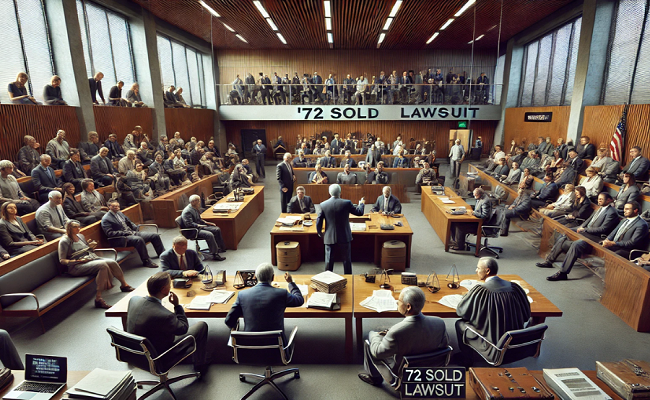
72 sold lawsuit
The real estate industry has experienced a significant shift with the advent of innovative home-selling models like 72 Sold. Promising home sellers a faster, easier way to sell their properties in just 72 hours, this service quickly gained traction. However, as with any high-profile business model, it hasn’t been without controversy. A 72 Sold lawsuit recently garnered attention, raising questions about the legality and fairness of its practices.
In this article, we’ll delve into the 72 Sold lawsuit, exploring the reasons behind the legal action, its implications for home sellers, and what it reveals about the business practices of modern real estate companies. We’ll also look at the broader context of real estate transactions and the challenges companies face when trying to revolutionize long-established processes.
What is 72 Sold?
Before diving into the 72 Sold lawsuit, it’s important to understand the concept behind 72 Sold. The company is a real estate service that offers an expedited home-selling process. Unlike traditional home sales that might take months, 72 Sold guarantees to sell your property within 72 hours of listing. This process involves agents working directly with sellers to get their homes listed and quickly generate offers from a network of investors.
The appeal of the 72 Sold model is clear: homeowners looking to sell quickly, without the usual stress of long-term negotiations and waiting for buyers, found this service to be an attractive alternative. Sellers were promised a quick, transparent transaction with less hassle, but as we will see, things didn’t always go according to plan.
The Origin of the 72 Sold Lawsuit
The 72 Sold lawsuit centers around allegations of deceptive business practices and breach of contract. While the service promised homeowners a fast, efficient sale, several customers have filed complaints claiming the process didn’t live up to expectations.
The lawsuit was filed after multiple sellers reported issues such as:

- Unfair Terms: Home sellers alleged that the terms of the contracts were not fully disclosed or were misleading. For example, some sellers complained that they were locked into agreements with high fees or restrictive clauses that they hadn’t fully understood.
- Hidden Costs: Many customers claimed that 72 Sold added additional fees or commissions that were not made clear at the outset, reducing the overall profits from their home sale.
- Misrepresentation of Offers: In some cases, home sellers felt that the offers they received were far lower than expected, despite the company’s promises of competitive bidding and quick sales. Sellers were concerned that they were not truly receiving offers from multiple buyers, as was advertised.
These complaints, combined with others from the real estate community, led to a significant backlash and the eventual 72 Sold lawsuit.
The Allegations Against 72 Sold
At the heart of the 72 Sold lawsuit are the accusations of deceptive and unethical business practices. Plaintiffs have argued that:
- Misleading Marketing: The company allegedly marketed itself as offering a streamlined, quick process for selling homes. However, some sellers found that the promises of a quick sale were far from reality. In some cases, homes took far longer to sell, and sellers felt they were not fully informed of potential delays or obstacles.
- Lack of Transparency in Fees: One of the key complaints revolves around hidden fees. Many homeowners felt that the fees for the 72 Sold service were not fully disclosed at the time of signing the agreement. They also alleged that additional charges cropped up throughout the process, eroding their profits.
- Unfair Contracts: Sellers also raised concerns about the contracts they signed. According to the lawsuit, these contracts were sometimes difficult to understand, contained clauses that benefited the company more than the seller, and in some cases, left the seller with little recourse to dispute unfavorable terms.
What Does the Lawsuit Mean for Home Sellers?
For home sellers, the 72 Sold lawsuit raises significant concerns about transparency, fairness, and business ethics in real estate transactions. Here are some key takeaways for consumers:
- Read the Fine Print: The 72 Sold lawsuit highlights the importance of thoroughly reviewing contracts before committing to any service. Homeowners should be aware of all terms, fees, and possible contingencies before proceeding with a home sale.
- Understand the Costs Involved: While a quick sale might seem like a good deal, sellers need to make sure they fully understand the costs involved. Hidden fees and commissions can eat into profits, leaving sellers with far less than they had expected.
- Know Your Rights: The 72 Sold lawsuit serves as a reminder to homeowners that they have the right to challenge unfair practices. If a company is not honoring its agreements or is engaging in deceptive practices, sellers should know that legal recourse is available.
Implications for the Real Estate Industry
Beyond the individual claims, the 72 Sold lawsuit has broader implications for the real estate industry as a whole. The rise of companies offering alternative ways to sell homes—whether through quick-sale services like 72 Sold or through online platforms—has shaken up the traditional model of home selling.
However, as this lawsuit demonstrates, any business model that promises fast, convenient services must be built on a foundation of transparency and fair practices. The case may prompt other companies in the space to reevaluate their practices and ensure they are fully complying with regulations.
Additionally, the lawsuit may encourage stricter oversight of real estate companies, particularly those that engage in unconventional business models. Regulators may begin to scrutinize marketing claims, fee structures, and contracts more closely to protect consumers from potential exploitation.

What Can Home Sellers Learn from This Case?
The 72 Sold lawsuit serves as a cautionary tale for home sellers considering alternative methods for selling their homes. Here are some lessons to take away:
- Don’t Settle for the First Offer: Even if a service guarantees a quick sale, home sellers should avoid rushing into an agreement without exploring other options. Comparing offers from different companies and agents is a prudent step to ensure you are getting the best deal.
- Research the Service Thoroughly: Before choosing a real estate service, do your due diligence. Check reviews, ask for references, and research any legal or regulatory issues associated with the company. The 72 Sold lawsuit might just be the tip of the iceberg when it comes to issues within this space.
- Seek Legal Advice If Needed: If you feel that a contract is unfair or unclear, it may be worth consulting a lawyer who specializes in real estate law. A legal professional can help you understand your rights and determine whether any deceptive practices are at play.
The Future of 72 Sold and Its Reputation
As the 72 Sold lawsuit continues to unfold, the company will likely face increased scrutiny. Whether or not they are found guilty of any wrongdoing, the controversy surrounding their business practices could tarnish their reputation in the long term. If the company wants to recover from the legal battles, they will need to take significant steps to rebuild trust with their customers.
This might involve clearer disclosures about fees, more transparent marketing, and offering fairer terms in their contracts. Until these issues are addressed, however, the 72 Sold lawsuit will likely remain a cautionary tale for both home sellers and real estate companies looking to innovate in this highly competitive market.
Conclusion
The 72 Sold lawsuit has exposed some of the challenges and risks associated with modern real estate services. While the promise of a quick sale is attractive, sellers must be cautious and fully understand the terms before entering into an agreement. This case serves as a valuable lesson for both consumers and companies within the real estate sector. Transparency, fairness, and a commitment to ethical business practices are paramount, especially in an industry where trust is a cornerstone of the transaction process. The future of services like 72 Sold will depend on their ability to address these concerns and rebuild credibility with their customers.
FAQs
What is the 72 Sold lawsuit about?
The 72 Sold lawsuit centers around accusations of deceptive business practices, including misleading marketing, hidden fees, and unfair contracts. Home sellers have alleged that the service did not meet its promises and that the fees and terms were not fully disclosed.
How does 72 Sold work?
72 Sold offers a service where they promise to sell a home within 72 hours. The process involves working with real estate agents to list the home and attract offers from investors.
What are the main complaints in the lawsuit?
Home sellers claim that 72 Sold misled them about the speed and price of the sale, and they also allege hidden fees and unclear contract terms.
Can homeowners trust 72 Sold after the lawsuit?
While the lawsuit has raised concerns about transparency and fairness, homeowners should carefully research the service, read the terms thoroughly, and weigh all options before proceeding.
How can sellers avoid issues with services like 72 Sold?
Sellers should ensure they understand all terms and fees, compare offers from different services, and seek legal advice if they feel any contract terms are unfair.
What will happen to 72 Sold after the lawsuit?
The outcome of the lawsuit will depend on the court’s decision, but it is likely that 72 Sold will need to improve its business practices to regain customer trust and avoid further legal issues.







